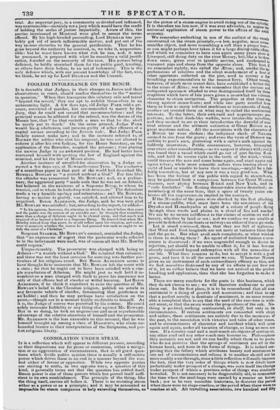FOOLISH INTOLERANCE ON THE BENCH.
IT is desirable that Judges, in their charges to Juries and their observations in court, should confine themselves to the " matter in question." When they transgress this salutary rule and travel "beyond the record," they are apt to exhibit themselves in an unbecoming light. A few days ago, old Judge PARR told a pri- setter, convicted of murder, but recommended to mercy by the Jury, that he could not second that recommendation : and the principal reason he adduced for the refusal, was the decree of the Mosaic law, that " he that sntiteth a man so that he die, shall be surely put to death." On the sante ground, Judge PARK would hang adulterers, and persons guilty of other offences of a capital nature according to the Jewish codii. But Judge PARK luckily cannot make law; and in the instance referred to, of RICKEY the soldier who shot his sergeant, he was not allowed to enfirree it after his own fashion, for the Home Secretary, on the application of the Recorder, respited the prisoner; thus placing the unwise Judge in an awkward position. He had better have contented himself with quoting the law of England against the criminal, and let the law of Moses alone.
Another instance of uncalled-for observation by a Judge oc- curred a few days ago, at Newcastle-upon-Tyne. The conductor of a scurrilous paper in that part of the world had described Mr. RUSSELL BOWLRY as " a wretch without a God." Fur this libel the offender was prosecuted by Mr. BOWLDY; and, as a prelimi- nary, the aggrieved party " made oath that he was not an Atheist, but believed in the existence of a Supreme Being, in whom ho trusted, and to whom he looked up with reverence." The defendant made a very humble apolasy and retractation ; an I Mr. BOWLIIY, having no malice to gratify, a as satisfied, and allowed him to be acquitted. Baron ALDERSON, the Judge, said lie was very glad Mr. Bowsee was satisfied ; but, according to the report, he added- " In his opinion, however, the situation in which he 'stood before that court and the public was the reverse of an enviable one he thought that something more than a charge of Atheism ought to be cleared away, and that much was required of us beyond a belief in a Supreme Being. lie trusted that when Mr. Bowlby retired from that court, he would reflect upon his situation, and endea- vour to ascertain whether the course he had pursued was such as ought to sa- tisfy the mind of a Christian."
Sergeant STARK1E, Mr Bowtuv's counsel, reminded the Judge, that "an expression of regret that the particular words referred to in the indictment were used, was of course all that Mr. Bowlby could require." Unquestionably. The prosecutor was charged with being an Atheist—" a wretch without a God." He rebutted that calumny ;
and there was not the least occasion for claming into further par- ticulars of his religious creed. But Baron ALDERSON seems to have thought fit to insinuate that Mr. ROWLHY left the court with
a stain ; for that be ought not to have been satisfied with a sim- ple repudiation of Atheism. Ile might just as well hold it in- cumbent on a man charged with theft to prove his innocence not only of that offence but of slander or wilful burning. Let Baron
ALDERSON, if he think it expedient to raise the question of Mr.
Bowsew's belief in the Christian religion, publish an article in any favourite vehicle of slander, denouncing that gentleman as aninfidel ; and then be may perhaps have satisfaction on the point,—though not in a manner highly creditable to himself. As it is, the Judge of course was protected by his ermine. He could safely insinuate Infidelity or any thing else against Mr. Bowstiv.
But in so doing, he took an ungenerous and must reprehensible advantage of the relative situations of himself and the prosecutor.
Mr. ALDERSON is the lesS excusable on this account, that he was himself brought up among a class of Dissenters, who claim un- bounded licence in their interpretation of the Scriptures, and per- fect.religious liberty.


























 Previous page
Previous page